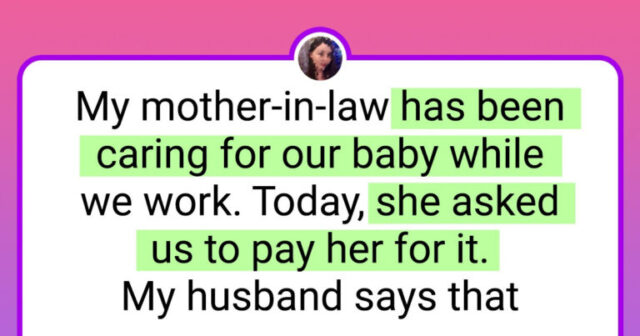
Having a child is no easy task. While in the past raising and caring for little ones was considered solely the mother’s job, this has changed over time. In households where both parents work, they must have help to keep the house in order and take care of the baby. Oftentimes, a family member can be the savior to all these problems. However, in Amy’s case, this ended up posing a dilemma for her to solve.







Hi, Amy! Thanks for your letter. We got together here at NISE and discussed your situation. These were the best tips we could come up with.
Try to understand why your mother-in-law asks you for payment to take care of her granddaughter. You said that she recently retired, and, according to experts, retirees are worried that their savings will dry up. This could be the reason for her request. The only way to find out is to have an open conversation, which brings us to the next point.
Talk to your mother-in-law. Set up an open and honest conversation and calmly and maturely tell her how you feel. Small talk can get derailed and off track, so we’ve put together a 3-step guide to keep the dialogue from turning into a fight/argument.
Step 1: Don’t assume your mother-in-law is going to react negatively.
Step 2: Say how you feel without having to justify anything. For example, say “I feel misunderstood” instead of “I feel misunderstood because you asked for this and…” By using the former, you invite your mother-in-law into an argument without forcing her to be defensive.
Step 3: Emphasize what you do, not what you don’t.





Qualified strangers or caring relatives — which would you choose? Remember that hiring a qualified babysitter is probably more expensive than what your mother-in-law would ask for. Think about how you and your husband would feel most comfortable. Also, keep in mind that your mother-in-law raised the person you plan to spend the rest of your life with, so she must have done a lot of things right in terms of parenting.
Try looking for other solutions. A nursery has its own ups and downs, like higher costs and stress, plus it can mean more work for both parents (such as taking the baby to and from childcare). In addition, there will be days when your daughter will have to stay home, and then you will have to find someone you can count on to babysit her at the last minute.

Most grandparents don’t expect to be paid for babysitting, but it’s entirely reasonable to compensate for their time. Taking care of a child can be a full-time job. Feeding them, changing them, and watching over them at all times are not easy tasks, especially for the elderly.
We hope that these tips will ease your situation and that whatever happens, your relationship with your mother-in-law will only change for the better.
Who did you turn to when you needed help with your child? What would you do if a relative asked you for money in exchange for taking care of your kids?





